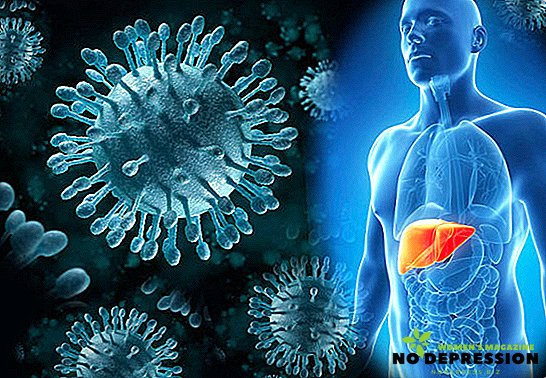Hepatitis C is an infectious disease that is considered the most dangerous among liver lesions. Called RNA-containing hepatotropic virus. The main feature is that asymptomatic for a long time. Despite the sufficient study of this disease, there are still a lot of myths about how you can get hepatitis C.

The main symptoms of the disease - what to look for?
In most cases, this pathology is slow, there are practically no symptoms - they usually appear with serious destruction of the liver tissue. It often happens that this diagnosis is made when the patient is already diagnosed with cirrhosis of the liver.
The incubation period of this disease lasts 1-3 months. But even after this period, the virus does not manifest itself in some patients until the liver damage becomes too pronounced.
But in the acute period, the disease can manifest weakness, fatigue, can occur under the guise of a cold with pain in the joints, muscles.
Jaundice and any clinical manifestations of hepatitis develop in a very small percentage of infected (the so-called icteric form of the disease). And this is actually excellent - patients immediately turn to specialists and they manage to cure the disease.
In what cases is the probability of infection high?
When carrying out any procedures during which non-sterile materials and tools are used, the risk of infection with hepatitis C is quite high. This applies to pedicure and manicure, tattoo, piercing. Especially if the experts do not comply with the rules of sanitary safety.
Infection can also occur when the joint use of drugs with the introduction of intravenous injections, because in this case there is an exchange of blood.
Methods for transmitting hepatitis C: how is the virus transmitted?
Through saliva and kisses
 The risk of transmission of the virus by these methods is reduced to zero, since the minimum amount of virus is in the saliva.
The risk of transmission of the virus by these methods is reduced to zero, since the minimum amount of virus is in the saliva.
From mother to child
Only in 5-7% of cases hepatitis C can be transmitted from an infected mother to the fetus. During pregnancy, the virus is not transmitted through the placenta, but the child may become infected when passing through the birth canal.
True, it is worth noting that in Russia at the moment there are no methods for early inspection of the fetus and unborn child - any tests can be carried out not earlier than 1 year after birth.
There are no precise studies that can confirm or deny whether the virus is transmitted from mother’s milk. However, doctors do not recommend feeding the child to an infected mother if there are cracks in the nipples, wounds, etc., because the virus is transmitted directly through the blood.
Domestic or airborne
Domestic way this virus is not transmitted 100%. No use of common kitchen items, no handshakes, no hugs, etc. will not lead to transmission of the virus. But in the presence of injuries, abrasions can be transmitted in living conditions, but the likelihood of this is very small.
The presence of infection should not be a reason for isolating this family member and creating special conditions for him. Just be careful in the presence of bleeding wounds in the carrier of the virus. Guys, carriers of the virus in Russia are exempt from military service.
Is it transferred from husband to wife?
It is difficult to get infected with this disease during intercourse, this happens only in 5% of cases. Moreover, infection is possible only if, with active friction, small injuries appear on the genitals, because the sperm and other fluids, other than blood, do not contain the virus.
Also, this can happen only in case of violation of the rules of hygiene, for example, with the joint use of nail accessories, razor, etc. Therefore, it is important to necessarily disinfect such items.
When infected can you get sick?
With strong immunity after infection, a person suffers a mild disease and recovers on his own. This happens in more than 20% of cases. However, in 70% of cases after infection, a person acquires a chronic form of the disease.
 It is for this reason that any carriers of this virus should be regularly examined, observed by a doctor, since the risk of virus activation remains until the end of life.
It is for this reason that any carriers of this virus should be regularly examined, observed by a doctor, since the risk of virus activation remains until the end of life.
However, you can become infected and remain a carrier forever. The virus slowly multiplies, this process is asymptomatic. When tested, neither liver biopsy nor liver tests go beyond, there are no changes.
It should be remembered that a person does not develop immunity to the virus, so the risk of being infected remains with repeated infection.
Who needs to be especially careful: attention, risk group!
High risk of being infected with this virus is observed in the following categories:
- in people who underwent blood transfusion prior to 1987;
- health care workers who are in regular contact with infected with this virus;
- people who inject drugs, HIV-infected.
The average suit of infection is present in the following citizens:
- people suffering from liver disease;
- hemodialysis patients;
- children who are born from an infected mother.
Low risk of infection is observed in:
- people who are sexually active with different partners without the use of protection;
- any health care providers.
Persons who are at risk are required to undergo an examination once a year. And medical workers also every time after an unintentional puncture with a needle or when patients hit their skin on the skin.
Hepatitis tests are required to be given regularly to HIV-infected people.
What if there is an infected in the family?
The main thing is not to isolate the patient in any way - you just need to follow all the hygienic rules. For example, when the blood of an infected family member hits any surfaces, they must be treated with any chlorine-containing agent. Fit:
- Domestos;
- White.
If blood gets on your skin, thoroughly rinse this area with Chlorhexidine.

Linen and clothes should be washed at high temperatures: at +60 degrees the virus dies within half an hour, while boiling - within 2-3 minutes.
And the carrier of hepatitis C must comply with the following rules:
- if there are any injuries, abrasions, bleeding, you must immediately tie up the injury site and seal it with a plaster;
- when assisting an infected family member, you can’t do without rubber gloves;
- It is necessary to use individual manicure sets, razors, epilators, toothbrushes.
Preventive actions
In order not to get infected with a virus, you should remember about a number of preventive measures that will help you in this.
Prevention of hepatitis C is as follows:
- during sexual intercourse it is recommended to use condoms;
- do not use other people's personal care products;
- without fail get vaccinated against primary forms of hepatitis;
- always monitor the sterility of used medical instruments (for example, when donating blood in a hospital, etc.);
- use the services of exclusively proven tattoo parlors.
Moreover, it is recommended to adhere to the above measures not only to those at risk, but also to all people.












